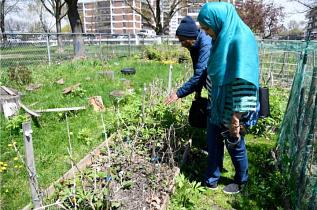How community gardens offer Toronto neighbourhoods a chance to grow
When some people in Toronto’s Thorncliffe Park neighbourhood decided to grow their own vegetables, they were faced with an immediate problem.
Thorncliffe Park is a densely populated community with a lot of highrise apartment buildings and little spare land. Finding space for the garden plots was a challenge.
Yet Sabina Ali and several of her neighbours had a plan. They approached the City of Toronto and asked if they could plant their flowers and vegetables on municipal land. And it turns out, they can: the City of Toronto offers small urban communities and neighbourhoods a chance to grow their own gardens in city parks.
The Thorncliffe Family Garden was born.
Ali, a founding member of the Thorncliffe Family Garden and executive director of the Thorncliffe Park Women’s Committee, says the community garden was established in 2011 and was first planted in R.V. Burgess Park in 2012. There are 15 plots reserved for the community, including four plots for seniors and one for children. In the summer, there is a drop-in program available for children to learn about the earth’s ecosystem.
“Our vision for this place was to make it a place of engagement,” Ali said. “This park was not taken care of. There was nothing in the park so people never used to visit.”
“For 10 years, we worked hand in hand with the city and we got a lot of things for the park, (such as) the splash pad and the garden,” she added.There are four stages required by the City of Toronto before a community gardening group can plant its garden. The group must have at least five members and a co-ordinator. It must also submit a proposal stating the specific area that will be used as a community garden, and that space must meet certain criteria, including having six hours of sunlight with proper water resources, no disruption of underground pipes or lines, easy access to the community and no disruption of any park activities.

Sabina Ali (left) and Alice Cariman of the Thorncliffe Family Garden in Toronto.
Anussa Nithiyananthan/Global News
Saida Osman, a community programmer with the city’s parks and recreation department, works with community garden groups in Toronto. She helps the city’s community garden supervisor review proposals.
“The proposal contains the designs and plans for the community garden. If resources from community garden groups are available, the city does provide help with installation,” Osman said.
There are many benefits to building a community garden. One is a lower risk of floods, an ongoing problem throughout Canada. Beyond that, Ali says that these gardens provide the community with a chance to engage with their neighbours and neighbourhood. The Thorncliffe community is very diverse, and the members of Ali’s gardening committee change every year so participating is a way to meet new people.
“It’s a way to exchange vegetables, and they have conversations with each other,” Ali said. “During the cold season, they don’t see each other so it’s a good way to come out to water the plants and see their friends in the community.”
Parks and recreation will review four community garden proposals for this year in Scarborough, Etobicoke, North York and one along the lakeshore. The wait time to have proposals approved is about nine months.
“Some people are in the early stages,” Osman said. Part of the process includes holding a public consultation to make sure the community supports the plan.
“Once we complete our community garden implementation procedure and there is no opposition from the community then we move forward with the garden installation.”
At the end of this month, Ali and her gardening committee plan on cleaning Thorncliffe Park’s garden so they can plant in June.
Comments
There are 0 comments on this post






